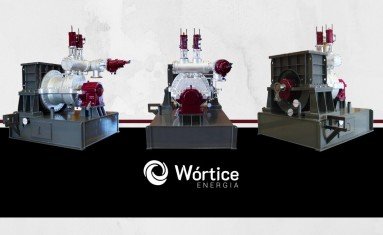How to generate energy from a steam turbine?
First, let's remember what a turbine is.
Turbines are rotating machines, that is, they are machines that transform the internal energy of a fluid into mechanical energy operating in cycles. The working fluid can be steam, gases, vapor-gas mixtures or liquids.
The most popular fluids are:
- Water – Hydraulic / hydroelectric turbine
- Air – Wind turbine
- Gases (several) – Gas turbine
- Steam – Steam turbine
In this article, the operation of a steam turbine will be briefly explained.
Compared to other types of fluids, a steam turbine has a continuous flow, is not dependent on climatic factors and does not require the creation of dams or reservoirs.
The steam turbine is usually represented as follows:

The internal energy of the steam is given by the high temperature and pressure condition at the turbine inlet. Inside the turbine, the steam undergoes successive changes from a state of higher temperature and pressure to a state of lower temperature and pressure. This change in state results in an increase in volume, i.e., expansion of the vapor occurs.
The use of this expansion is carried out as follows:
- Inside the machine, stators are installed (a group of fixed blades or fins) that work by accelerating and guiding the injected steam against the rotors.
- Right after the fixed blades, a group of mobile blades (rotors) connected to a rotating shaft is placed. When propelled by steam, these blades produce work that will be transmitted through the shaft.
- Each stator-rotor assembly represents a stage and within the turbine multiple stages are used to improve steam expansion. The more stages, larger expandability and improve machine efficiency.
When coupled to a generator, the work produced in the turbine is converted into electrical energy, that can be used in the plant itself, driving other equipment or sold to a concessionaire.


